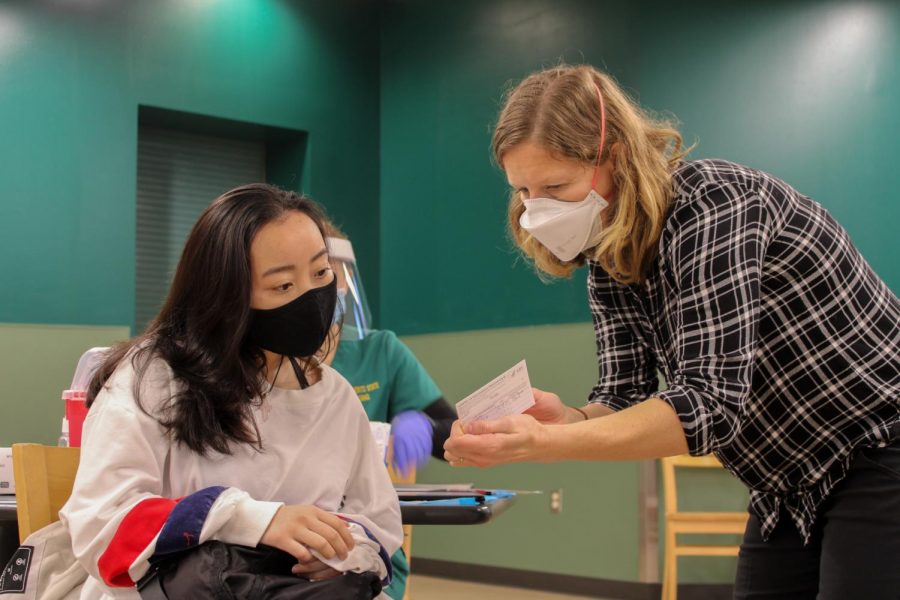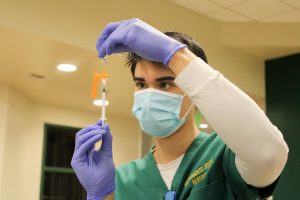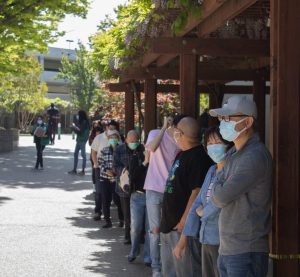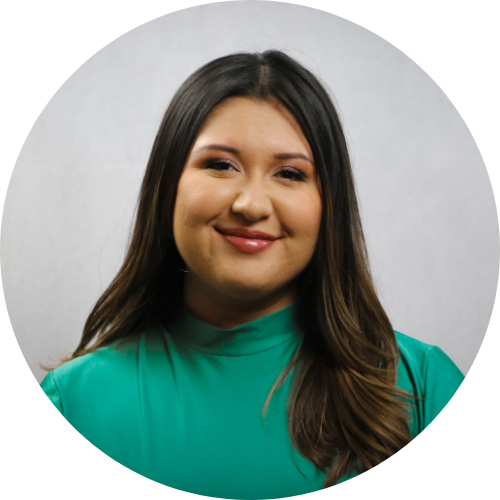Sac State students react to CSU decision to require COVID-19 vaccine
‘I don’t want to feel like my health may be threatened’
(File photo) Rachel McMichael, nurse practitioner at the WELL, verifies the identity of Rica Co, second semester nursing student, before injecting her with the COVID-19 vaccine in the Brown Bag room in the Union on Thursday, Jan. 28, 2021.
April 23, 2021
Sacramento State student Rodrigo Garcia was diagnosed with acute lymphoblastic leukemia, which is a type of cancer of the blood and bone marrow according to Mayo Clinic, as a 12-year-old, which led to an infection in his lungs.
Now as a 21-year-old cancer survivor, he said treatment has left him with life long issues — scarring of his lungs being one.
“It is very important for me to have a sense of ease when I am on campus,” Garcia, an international relations major said. “I don’t want to feel like my health may be threatened whenever I go to class or go to work.”
The California State University system will require faculty, staff and students who will be accessing campus facilities in fall 2021 to receive the COVID-19 vaccination upon the Food and Drug Administration’s approval, according to an email announcement by the CSU on Thursday.
RELATED: CSU to require COVID-19 vaccination for fall 2021 semester
The CSU’s requirement is dependent on the full approval of one or more vaccines by the FDA and will become effective at the beginning of the fall 2021 term or upon full FDA approval, whichever occurs later, according to the email.
Students and employees will be allowed to seek an exemption to the vaccine requirement based on medical or religious grounds, according to the email announcement by the CSU. This policy is also still under development and will be made available once final decisions are made.
The State Hornet spoke to several students, such as Garcia, for their opinions on the decision made by the CSU to require the COVID-19 vaccine for students, staff and faculty in fall 2021.
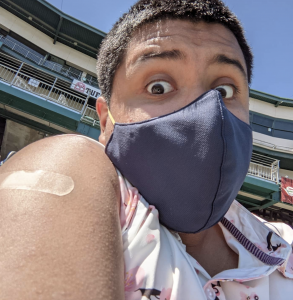
Garcia said through Twitter direct message that he agrees with the decision by the CSU to require the vaccine, because the system is doing its part to help reduce transmission of COVID-19 and that will help prevent future outbreaks.
Nyles Moriarty, a construction management major, said he should have the right not to get the vaccine. He said for the university system to discriminate against individuals who choose not to be vaccinated is unjust and unfair.
“All of my classes for next fall say they are online, but if this mandate continues to stand following next fall then I guess I’m left with no choice then to get vaccinated,” Moriarty said through Instagram DM. “I stand pretty heavy on not getting it, but I want to further my education to better my future.”
Moriarty added that he would consider getting the vaccine after a year or so of seeing what the vaccine has done to some people. He cited the reports of blood clots in six recipients of the Johnson & Johnson vaccine as to why he is hesitant to receive the vaccine.
On April 13, the J & J COVID-19 vaccine was temporarily suspended for use in the U.S. after rare blood clots were reported in six recipients.
According to a joint statement by the CDC and FDA, “these adverse events appear to be extremely rare.” As of April 12, more than 6.8 million doses of the J & J vaccine have been administered in the U.S., the federal health agencies said.
“With the vaccine it was no issue for me,” Garcia said. “I got the J & J vaccine and have been fine. I feel that this is necessary for things to go back to normal in a way.”
Moriarty said he did not want to feel like a test subject for the COVID-19 vaccine.
“They [CSU] say it’s for the betterment and health of the students and faculty, but I really have no clue,” Moriarty said. “This whole pandemic has been extremely confusing.”
Garcia said he understands that people have their concerns about the vaccine, but suggests that people trust the science.
“I have family members that tell me there is this huge conspiracy the government has planned, but I always felt that if that was the case something would have leaked by now,” Garcia said. “Americans aren’t the best secret keepers.”
He added if students are hesitant, they should consider that millions of Americans have already been vaccinated.
“I see the chances of any risk coming from getting vaccinated are slim to none especially since we have multiple vaccines to choose from,” Garcia said. “I had so much worse pumped into my blood during chemotherapy that I doubt this vaccine can do any worse.”
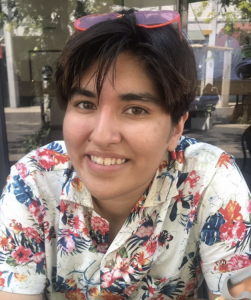
Junior Cas Hernandez is a transfer student, and his first semester at Sac State was in fall 2020 during a campus shutdown.
“I feel really nervous about returning to campus because I have a chronic lung condition,” Hernandez said through Instagram DM. “It’s really serious so neither me or my partner have even gone inside the grocery store [during the pandemic].”
He said that the CSU system announcement that the vaccine will be mandatory has lifted a weight off his shoulders.
“This upcoming semester, I really have to take some chemistry labs I put off as long as possible due to COVID-19, so I’m really glad that the CSU system is putting science and everyone’s health first,” Hernandez said.
RELATED: Sac State’s immunocompromised community reflects on a year of COVID-19
Forensic chemistry major Serena Sotelo will also be taking lab courses in the fall semester that require her to be in-person.
“Making the vaccine mandatory makes me feel so much safer especially since I live with family who have illnesses that make them more vulnerable,” Sotelo said through Instagram DM. “There’s a lot of anxiety with going back on campus but having the vaccine being mandatory makes me, as well as a lot of people I know, feel like my safety is a priority.”
Environmental studies major and graduating senior Gabriela Ventura said she thinks it is a completely valid requirement and understands where the CSU is coming from.
“I’m sure they don’t enjoy having students go through online school either,” Ventura said through Instagram DM. “It seems more of a preventative measure than anything as well. I personally don’t mind because I already received my first dose as soon as I was eligible!”
Ventura said she does not understand how requiring the vaccine is unfair.
“Getting a vaccine is an incredible privilege that most people don’t have yet,” she said. “Not to mention that it’s about protecting yourself and protecting others that are most vulnerable.”
Ventura said she will graduate this semester, but that next semester’s students have to accept some risk having in-person classes.
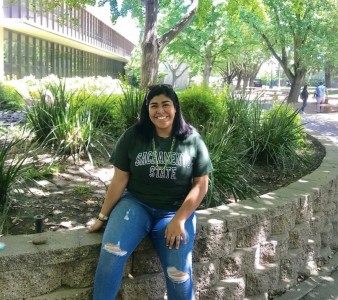
Regarding how the CSU could protect its students aside from requiring the COVID-19 vaccine, Moriarty said, “Why can a bar be packed full of people, or why can a restaurant be packed full of people… but a classroom can’t be packed with 20-30 students?”
Sac State could hold classes with at least 50% capacity in the fall 2021 semester, Provost Steve Perez said in a Faculty Senate meeting on March 18.
RELATED: Sac State students should expect to return to campus in fall 2021, provost says
According to Ventura, aside from the vaccine, the only thing students can do is wear masks, wash their hands and stay six feet apart. It would be nice to see CSU enforce those CDC guidelines, she said.
“To me requiring vaccines is not bad, we all had to show proof of vaccination before entering primary school,” Ventura said. “It’s not the end of the world. If people decide that it’s unfair then that will be up to them and the school.”
Hospitality and tourism major Eliot Park said the requirement was a smart call for Sac State.
“It is absolutely essential for athletics and campus programs to return,” Park said. “It [campus programs] will return, but we must do it safely, and the only simple task is getting ourselves a COVID-19 vaccine. It’s that simple.”
RELATED: Isolation and grief: Sac State students cope with declining mental health during pandemic
Park said it is understandable for those who have medical or religious restrictions to be hesitant to take the COVID-19 vaccine.
Vice President of Student Affairs, Ed Mills, told The State Hornet Thursday that he advises students who are unsure if they want to take the vaccine to register for classes like normal based on the classes they need to graduate. Mills also said students will be allowed to make changes to their schedule from June 1 through June 11, as well as three weeks in August before the fall semester begins.
Park said he recommends those that are hesitant to take the COVID-19 vaccine who do not have medical or religious restrictions utilize the resources he listed below.
“Reach out to Student Health and Counseling Services to obtain reliable and proven information of the vaccine efficacy,” Park said. “Talk to a friend or family member who has gotten the COVID-19 vaccine, follow social media accounts such as Sac State and contact your health provider in deciding one’s safety.”
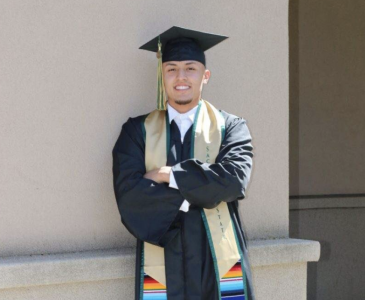
Anthony Isaiah Calderon, a criminal justice major and psychology minor, said the requirement allows individuals who are living with their grandparents or other elderly family members to be at ease and comfortable being around them.
“For me, I live with my grandparents, and I am in constant contact with them,” Calderon said through Twitter DM. “However, since I intern for a county job, I was able to get the vaccine.”
Calderon said he thinks people are also a little inconsistent about their opinions on what they put into their bodies.
RELATED: COVID-19 vaccinations for Sac State students begins on campus Wednesday
“COVID-19 has taken too many lives, family and friends, for us to overlook this because ‘we don’t know what’s in it’,” Calderon said. “People constantly eat meals and food without even knowing where it came from or what ingredients were used to complete the dish.”
According to the CDC, 566,494 people in the U.S. have died due to COVID-19 as of Friday.
Liberal studies major Sierra Haro said she feels that forcing and requiring a vaccination goes against her rights as an American in order to complete a higher education.
“Requiring a vaccine is something that goes against several beliefs, whether they be personal or religious,” Haro said in an Instagram DM. “If this was for the bettering of our community and helping out the community stay healthy, I understand that, but so is the flu vaccine, and that vaccine isn’t required, it is recommended.”
She said she believes that students have a right to determine what goes in their body and what comes out of their body.
Haro said she understands that many people do not agree with her opinion and are entitled to an opinion of their own, but she still finds an issue with the school system’s requirement.
“What the school system has done is take their opinion and force it amongst all incoming, current, and future students instead of listening to both sides,” Haro said.
Alejandro Sanchez, an environmental science major with a minor in biology, said as a student and scientist, he endorses the decision by the CSU administration.
“It will help maintain safety through the whole duration of the semester,” Sanchez said through Twitter DM. “That one was one of the biggest issues last year when some schools in Republican-led states tried to re-open too quickly. They opened and only a couple weeks in had to close up again and were scrambling to get students tested [and] accommodate students in the dorms while trying to transition back to online.”
The University of North Carolina at Chapel Hill closed after briefly trying to hold classes in-person in the fall and schools in Georgia and Nebraska had to implement rigorous testing programs after outbreaks they had in the fall, according to The New York Times.
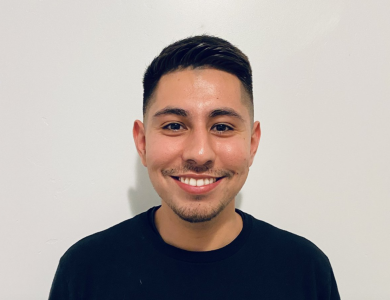
According to Sanchez, this decision will not only help Sac State be the safest but will help students stay on campus permanently without the risk of an outbreak. He said Sac State also needs some kind of public health campaign to educate students who might be hesitant to get the vaccine.
“I believe that Sac State and the CSU have done a poor job of campaigning when it comes to vaccine advocacy.” Sanchez said. “The first time that I heard the school talk about vaccines was probably last week when students became eligible.”
He said the university and the CSU should take an approach similar to the state where even Gov. Gavin Newsom is on TikTok doing videos promoting California residents to receive the COVID-19 vaccine.
Sotelo said she thinks the school does a pretty good job at public health announcements, as she receives emails and sees the updates on the CSUS website.
Additionally, she said there are many social media sites and accounts that spread public health information on their accounts, such as some club accounts like the Women in STEM club that have reposted vaccine information on their story.
“The school could do better at encouraging students to get the vaccine though because I don’t see that often enough,” Sotelo said. “Most announcements just state the facts, but I never see any encouragement. At the very least, maybe they could explain the benefits of the vaccine to encourage students.”
Where can students get vaccinated for COVID-19?
Sac State students began to receive email invitations to be vaccinated for COVID-19 at the university’s vaccination site in the University Union on April 13.
Vaccination invitations are delivered to students’ Sac State emails. Students whose addresses listed in their Student Center are located in Sacramento County will be the first group to receive an invitation from Sac State, according to an email from Sac State public information officer Anita Fitzhugh.
According to Fitzhugh, invitations to students living outside of Sacramento County will be delivered each week as quickly as possible. She said students who wish to be vaccinated at Sac State sooner but live outside of Sacramento County may fill out a short survey to receive an invitation.
Students can also make appointments through “My Turn”, the California Department of Public Health’s system to vaccinate California residents for COVID-19. The system is designed to inform residents when they are eligible to receive the COVID-19 vaccine and where they can get vaccinated.
Everyone 16 years of age and older is now eligible to get a COVID-19 vaccine, according to the CDC.
Additional reporting by Erick Salgado.






























































































































